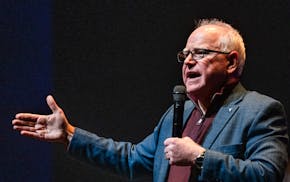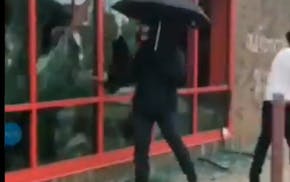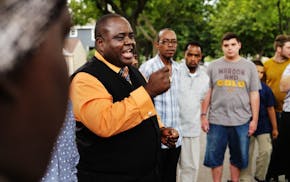A Minnesota state agency is currently surveying LGBTQ residents to learn more about the experiences and challenges facing the community.
It has been 30 years since Minnesota undertook a similarly ambitious effort.
The survey is the first major initiative of the Council on LGBTQIA2S+ Minnesotans, which was formed in 2023 and operational as of last May. Securing feedback from residents will help the council prioritize its time and resources effectively, said Executive Director Emma Watts.
"LGBTQ+ communities have historically been understudied, underfunded, and there's a lot that we can learn. Data drives policy," she said. "We want to make sure that we're adequately serving the community and their current needs."
The council will use the data to inform policy recommendations, funding and community programming for LGBTQ Minnesotans. About 460,000 Minnesota adults identify as LGBTQ, according to the U.S. Census Bureau's 2024 Household Pulse Survey.
Respondents answer survey questions about safety, community connection, access to health care and demographics. The anonymous survey had more than 1,800 responses as of April 10.
The last time the Minnesota community was comprehensively studied was in the early 1990s, when then-Governor Rudy Perpich appointed a Task Force on Gay and Lesbian Minnesotans. While the group had no funding, it met 40 times. The task force was asked to report on evidence of anti-gay discrimination in Minnesota.
"The overwhelming body of testimony and data indicates that discrimination against gays and lesbians is wide-spread. It is perhaps worse in Greater Minnesota, where gays fear the loss of jobs and housing, although this is also an issue in the Metro area," the group said in a 1991 report.
The report also recommended the formation of a council like the one that now exists today.
Several organizations and spaces are partnering with the council to spread the word about the survey. There are paper copies available at Queermunity in Uptown Minneapolis, for older folks who may not be tech-savvy or anyone who would prefer not to fill it out electronically, said Hilary Otey, who co-founded the space.
Council members will be available at Queermunity events to answer questions about cybersecurity or how the data will be used, Otey said.
"This is a good, safe way for us to express ourselves," Otey said. "Rather than putting your name or face out there, which could potentially be dangerous these days, you could still make your voice known and your needs known in that way."
The needs assessment has become more necessary this year, Watts said, calling the federal cuts to programs that serve LGBTQ people and fund LGBTQ research incredibly alarming.
"Now more than ever, we need visibility. This kind of data, this kind of storytelling, is visibility, and it shows that LGBTQ people are here ... that we're in every corner of the state," Watts said.
To participate, LGBTQ individuals must be 18 or older and reside in Minnesota. Parents or guardians of LGBTQ individuals may also participate in the survey.
The survey will close on May 31.

Gov. Tim Walz to give political speeches in South Carolina and California, fueling 2028 speculation

Republicans seek to gut federal funding for three Minnesota transit projects

Who was Umbrella Man, who smashed windows before 'first fire' in 2020 Minneapolis protests?
Worried about the future? We predict you'll read this story about a high-profile St. Paul astrologer

